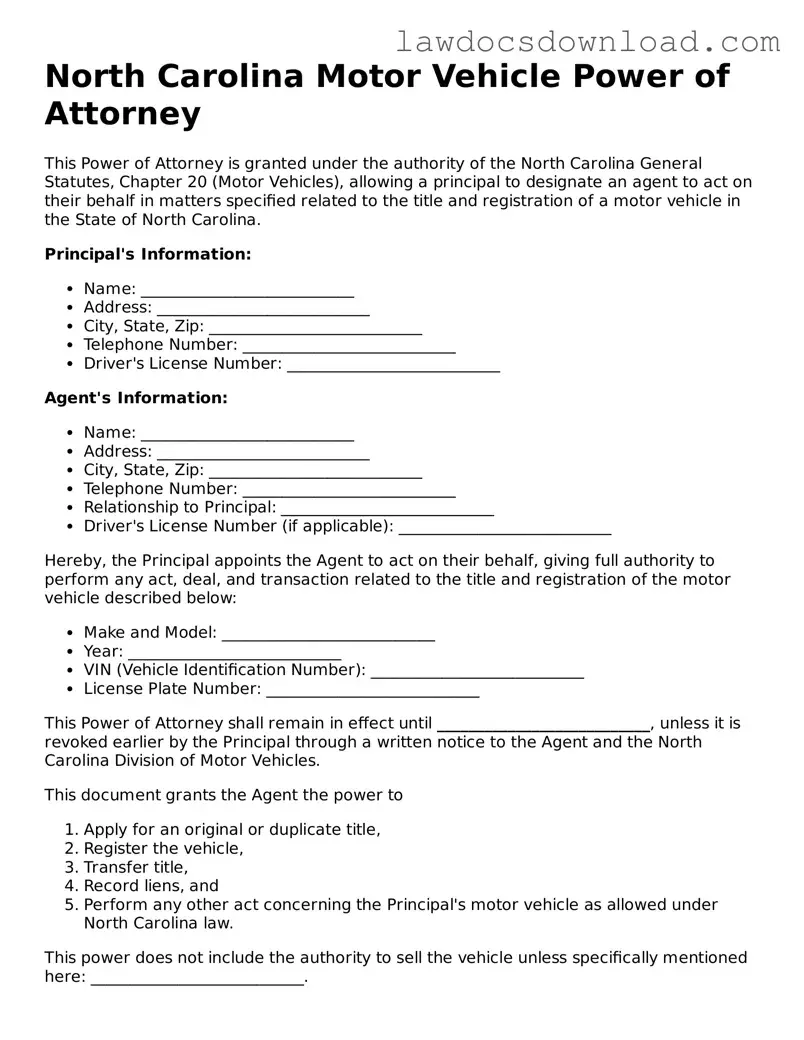Filling out the North Carolina Motor Vehicle Power of Attorney form can seem straightforward, yet many find themselves stumbling over common pitfalls that can lead to delays or even the rejection of their application. Being aware of these common errors can save you time and ensure your paperwork proceeds without unnecessary hiccups.
One common mistake is not providing complete information about the vehicle in question. This includes the make, model, year, and Vehicle Identification Number (VIN). Each detail is crucial for the identification of the vehicle and any omission can render the document invalid or cause significant delays in the process.
Often, individuals forget to specify the powers they are granting. The form enables you to authorize someone to perform a variety of tasks on your behalf, from selling the vehicle to registering it. Being vague or overly broad in this section can lead to confusion or legal complications down the line, so it's important to be as clear and precise as possible.
Ignoring the need for a witness is another frequent oversight. In North Carolina, it’s not just about signing the document; you also need at least one witness to attest to this process. Skipping this step can lead to the immediate invalidation of the form.
Signing before it's time is a misstep that is more common than one might assume. Some people sign the form before they have all the necessary information or before they fully understand what they are agreeing to. Remember, your signature should be one of the final steps, completed only when you are certain everything is in order and you understand the implications of what you're signing.
People often miss the importance of the notary public. In North Carolina, the Motor Vehicle Power of Attorney form must be notarized to be considered valid. This involves signing the document in front of a notary who then officially stamps it. Not doing so means your document won't hold up legally.
Details matter, especially when it comes to the correct spelling of names. It might seem minor, but a simple typo in the name of the principal or agent can lead to questions about the document's validity. Ensuring accurate spelling aligns with official identification papers is crucial.
Choosing an agent without the necessary trust or legal capacity is a critical error. Your agent will have significant power over your vehicle affairs, so it’s essential to choose someone who is not only trustworthy but also legally able to act in this capacity. This means they should be of legal age and mentally competent.
Another mistake is neglecting to provide contact information for both the principal and the agent. This might include addresses, phone numbers, and email addresses. Such information can be vital if clarification or additional communication is needed.
Failing to specify a validity period can cause its own set of problems. Without clear dates indicating when the power of attorney begins and ends, you may find the document doesn't serve its intended purpose exactly when it's needed.
Finally, a common oversight is not keeping a copy for personal records. Once the form is filled out, signed, witnessed, and notarized, make sure to keep a copy for yourself. This will be invaluable should there be any future disputes or if you need to reference the document for any reason.
Avoiding these common mistakes when filling out the North Carolina Motor Vehicle Power of Attorney form can save you from headaches and ensure your affairs are handled smoothly. Paying attention to the details and proceeding carefully can make all the difference.

